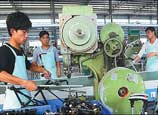
News about nearly 100 workers of the China Railway Tunnel Group (CRTG) beating up villagers and smashing their homes on February 13 in Southwest China's Yunnan Province has made headlines over the past few days.
It has caused not only a serious hit to the CRTG's image but also fueled public fury at already ill-favored State-owned enterprises (SOEs).
The initial police investigation has shown that several villagers attempted to extort money from passing workers by pretending to be splashed with mud, which sparked a fight and incited the workers to take revenge.
But this cannot excuse the railway company from the neglect it has shown in managing its workers.
The CRTG management has to be aware that no matter how scattered its countless projects are and how complex its personnel chain is, any incident happening at any construction site is closely linked to its brand name.
The negative public image of SOEs did not come from nowhere. A sense of privilege is often apparent among SOE employees, though to varying degrees. In some smaller cities or less-developed areas, large-scale SOEs often consider themselves as operating for the central government, treating the local governments and people as subordinates.
This time appears to have been an isolated incident. However, the moment the attack was exposed by the mass media, all public attention focused on the name of the company, which was already clouded by public outcries over the scandal-ridden Ministry of Railways.
Recent reports about SOEs' extravagant spending and greedy hoarding of wealth due to their monopolies have only made things worse. Suspicion and a sense of envy from the public have made SOEs easy targets for venting of discontent and allegations of corruption.
We hope that not only the China Railway Tunnel Group, but other SOEs as well, will rethink their public relations strategy and how their current negative portrayal came to be. These State giants should think about what they can do to change the situation, instead of complaining about the "irrationality" of public criticism.
SOEs are pillars of the national economy. Their influence is everywhere. But on the other hand, they maintain a distance from the public and are not entirely involved in market competition. Their management is more like that of government officials, seeking to stay away from the media and public.
SOEs are no longer safe from public scrutiny. They have to step out and interact with the public. An improved image for SOEs will ensure sustainable development of these companies as well as of the national economy.
















 China's 'leftover women' phenomenon arouses heated debate in West
China's 'leftover women' phenomenon arouses heated debate in West


![]()
